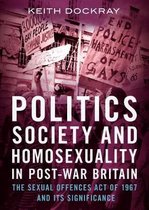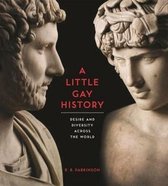Gay Men and the Left in Post-War Britain How the Personal Got Political
Afbeeldingen
Sla de afbeeldingen overArtikel vergelijken
- Engels
- Paperback
- 9780719086397
- 30 november 2011
- 232 pagina's
Samenvatting
Available in paperback for the first time, this book demonstrates how the personal became political in post-war Britain, and argues that attention to gay activism can help us to fundamentally rethink the nature of post-war politics. While the Left were fighting among themselves and the reformists were struggling with the limits of law reform, gay men started organising for themselves, first individually within existing organisations and later rejecting formal political structures altogether.
Culture, performance and identity took over from economics and class struggle, as gay men worked to change the world through the politics of sexuality. Throughout the post-war years, the new cult of the teenager in the 1950s, CND and the counter-culture of the 1960s, gay liberation, feminism, the Punk movement and the miners' strike of 1984 all helped to build a politics of identity.
There is an assumption among many of today's politicians that young people are apathetic and disengaged. This book argues that these politicians are looking in the wrong place. People now feel that they can impact the world through the way in which they live, shop, have sex and organise their private lives. Robinson shows that gay men and their politics have been central to this change in the post-war world.
Available in paperback for the first time, his book demonstrates how the personal became political in post-war Britain, and argues that attention to gay activism can help us to fundamentally rethink the nature of post-war politics. While the Left were fighting among themselves and the reformists were struggling with the limits of law reform, gay men started organising for themselves, first individually within existing organisations and later rejecting formal political structures altogether.
Culture, performance and identity took over from economics and class struggle, as gay men worked to change the world through the politics of sexuality. Throughout the post-war years, the new cult of the teenager in the 1950s, CND and the counter-culture of the 1960s, gay liberation, feminism, the Punk movement and the miners' strike of 1984 all helped to build a politics of identity.
There is an assumption among many of today's politicians that young people are apathetic and disengaged. This book argues that these politicians are looking in the wrong place. People now feel that they can impact the world through the way in which they live, shop, have sex and organise their private lives. Robinson shows that gay men and their politics have been central to this change in the post-war world.
Productspecificaties
Inhoud
- Taal
- en
- Bindwijze
- Paperback
- Oorspronkelijke releasedatum
- 30 november 2011
- Aantal pagina's
- 232
- Illustraties
- Nee
Betrokkenen
- Hoofdauteur
- Lucy Robinson
- Tweede Auteur
- Robinson
- Hoofduitgeverij
- Manchester University Press
Overige kenmerken
- Extra groot lettertype
- Nee
- Product breedte
- 156 mm
- Product hoogte
- 12 mm
- Product lengte
- 234 mm
- Studieboek
- Nee
- Verpakking breedte
- 156 mm
- Verpakking hoogte
- 13 mm
- Verpakking lengte
- 234 mm
- Verpakkingsgewicht
- 340 g
EAN
- EAN
- 9780719086397
Je vindt dit artikel in
- Categorieën
- Taal
- Engels
- Periode
- ca. 1950-1999
- Beschikbaarheid
- Leverbaar
- Boek, ebook of luisterboek?
- Boek
Kies gewenste uitvoering
Prijsinformatie en bestellen
De prijs van dit product is 17 euro en 99 cent.- Gratis verzending door bol vanaf 20 euro
- Ophalen bij een bol afhaalpunt mogelijk
- 30 dagen bedenktijd en gratis retourneren
- Dag en nacht klantenservice
Rapporteer dit artikel
Je wilt melding doen van illegale inhoud over dit artikel:
- Ik wil melding doen als klant
- Ik wil melding doen als autoriteit of trusted flagger
- Ik wil melding doen als partner
- Ik wil melding doen als merkhouder
Geen klant, autoriteit, trusted flagger, merkhouder of partner? Gebruik dan onderstaande link om melding te doen.








